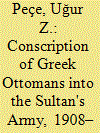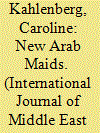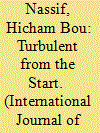|
|
|
Sort Order |
|
|
|
Items / Page
|
|
|
|
|
|
|
| Srl | Item |
| 1 |
ID:
174493


|
|
|
|
|
| Summary/Abstract |
With the reinstatement of the parliament in 1908, the Ottoman state faced new challenges connected to citizenship. As a policy to finally make citizens equal in rights as well as duties, military conscription figured prominently in this new context. For the first time in Ottoman history, the empire's non-Muslims began to be drafted en masse. This article explores meanings of imperial citizenship and equality through the lens of debates over the conscription of Greek Ottomans, the largest non-Muslim population of the Ottoman Empire. In contrast to the widespread suggestion of the Turkish nationalist historiography on these matters, Greek Ottomans and other non-Muslim populations enthusiastically supported the military service in principle. But amidst this general agreement was a tremendous array of views on what conscription ought to look like in practice. The issue came to center on whether Greek Ottomans should have separate battalions in the army. All units would eventually come to be religiously integrated, but the conscription debates in the Ottoman parliament as well as in the Turkish and Greek language press reveal some of the crucial fissures of an empire as various actors were attempting to navigate between a unified citizenship and a diverse population.
|
|
|
|
|
|
|
|
|
|
|
|
|
|
|
|
| 2 |
ID:
174491


|
|
|
|
|
| Summary/Abstract |
In this article, I make the claim that the time has come to re-situate the Gulf historically as part of the Indian Ocean world rather than the terrestrial Middle East. I explore the historical potential of thinking “transregionally” – of what it means to more fully weave the history of the Gulf into that of the Indian Ocean, and what the ramifications are for orienting it away from the terrestrially-grounded literature in which it has long been situated. The promise of an oceanic history, I argue, is both academic and political: first, it opens up the possibilities of new narratives for the Gulf’s past, suggesting new periodizations, fruitful avenues of historical inquiry, and new readings of old sources. But more than that, an oceanic history of the Gulf allows historians to push against the discourses of nativism that have pervaded the public sphere in the Gulf States.
|
|
|
|
|
|
|
|
|
|
|
|
|
|
|
|
| 3 |
ID:
174494


|
|
|
|
|
| Summary/Abstract |
The “new Arab woman” of the early 20th century has received much recent scholarly attention. According to the middle- and upper-class ideal, this woman was expected to strengthen the nation by efficiently managing her household, educating her children, and contributing to social causes. Yet, we cannot fully understand the “new Arab woman” without studying the domestic workers who allowed this class to exist. Domestic workers carried out much of the physical labor that let their mistresses pursue new standards of domesticity, social engagement, and participation in nationalist organizations. This article examines relationships between Arab housewives and female domestic workers in British Mandate Palestine (1920–1948) through an analysis of domestic reform articles and memoirs. Arab domestic reformers argued that elite housewives, in order to become truly modern women, had to treat maids with greater respect and adjust to the major socioeconomic changes that peasants were experiencing, yet still maintain a clear hierarchy in the home. Palestinian memoirists, meanwhile, often imagine their pre-1948 homes as a site of Palestinian national solidarity. Their memories of intimate relationships that developed between elite families and peasant maids have crucially shaped nationalist narratives that celebrate the Palestinian peasantry.
|
|
|
|
|
|
|
|
|
|
|
|
|
|
|
|
| 4 |
ID:
174492


|
|
|
|
|
| Summary/Abstract |
This paper explores the history of the alphabet revolutions in the Ottoman Empire and the Russian Empire, beginning in the 1860s and culminating with the new Turkish alphabet and the Soviet latinization movement in the 1920s. Unlike earlier works that have treated these movements separately, this article traces the origins of the alphabet revolutions to the 19th-century communications revolution, when the telegraph and movable metal type challenged the existing modes of knowledge production and imposed new epistemologies of writing on the Muslims in the Russo-Ottoman space. This article examines the media technologies of the era and the cross-imperial debates surrounding various alphabet proposals that predated latinization and suggests that the history of language reform in the Russo-Ottoman world be reevaluated as a product of a modernizing information age that eventually changed the entire linguistic landscape of Eurasia.
|
|
|
|
|
|
|
|
|
|
|
|
|
|
|
|
| 5 |
ID:
174495


|
|
|
|
|
| Summary/Abstract |
This article reconsiders military politics in Syria prior to the 1963 Baʿthi power grab in light of new sources. I undermine the presumptions that Baʿthi tactics of sectarian favoritism in the armed forces were unprecedented in post-independence Syria. I make the following arguments: first, attempts by the Sunni power elite to tame Syrian minorities were part of a broad sequence of events that spanned several regimes and informed politics in the Syrian officer corps; second, the various military strongmen who ruled Damascus intermittently from 1949 until 1963 distrusted minority officers and relied mainly on fellow Sunnis to exert control in the armed forces; and third, the combination of minority marginalization in Syrian politics and Sunni preferentialism inside the armed forces bred enmity and polarized sectarian relations in the officer corps.
|
|
|
|
|
|
|
|
|
|
|
|
|
|
|
|
|
|
|
|
|